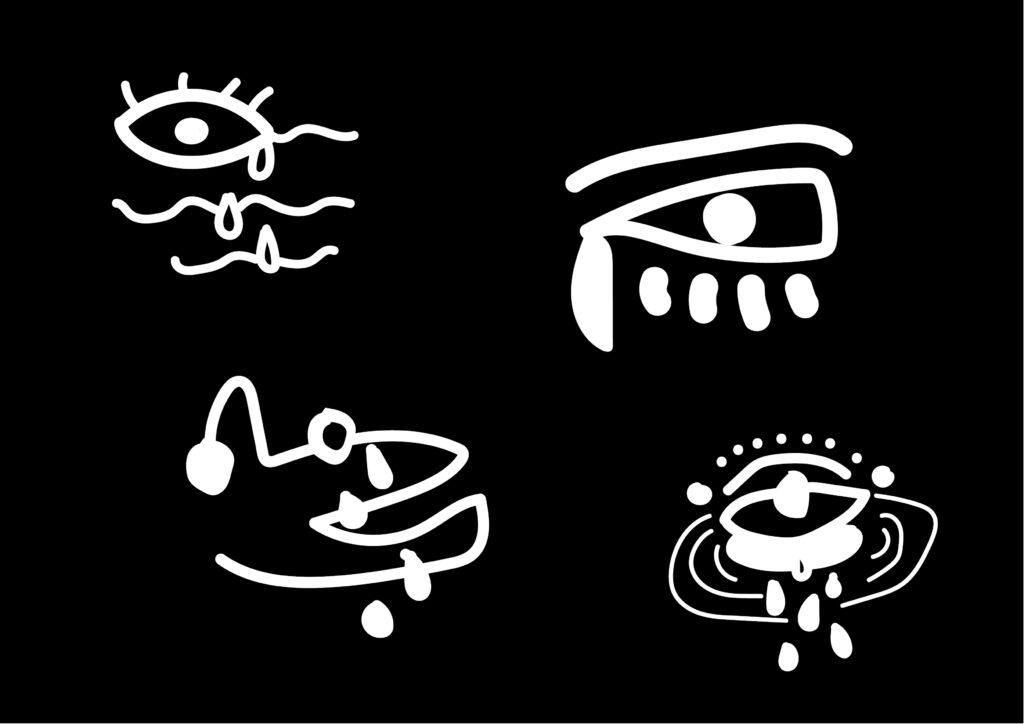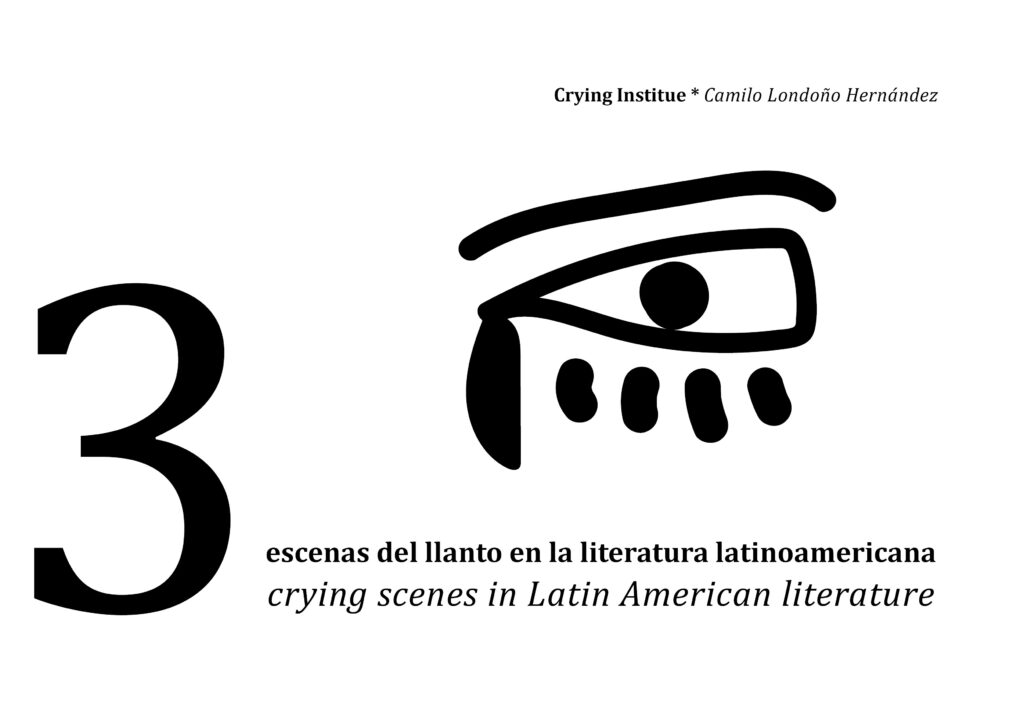
This is an open [personal] selection to share with my classmates at the Crying Institute. The procedure and methods to select them are based on personal affections and interpretations regarding crying and literature. Its curatorial process does not represent either a universal understanding of crying or a conclusive approach to Latin American literature.
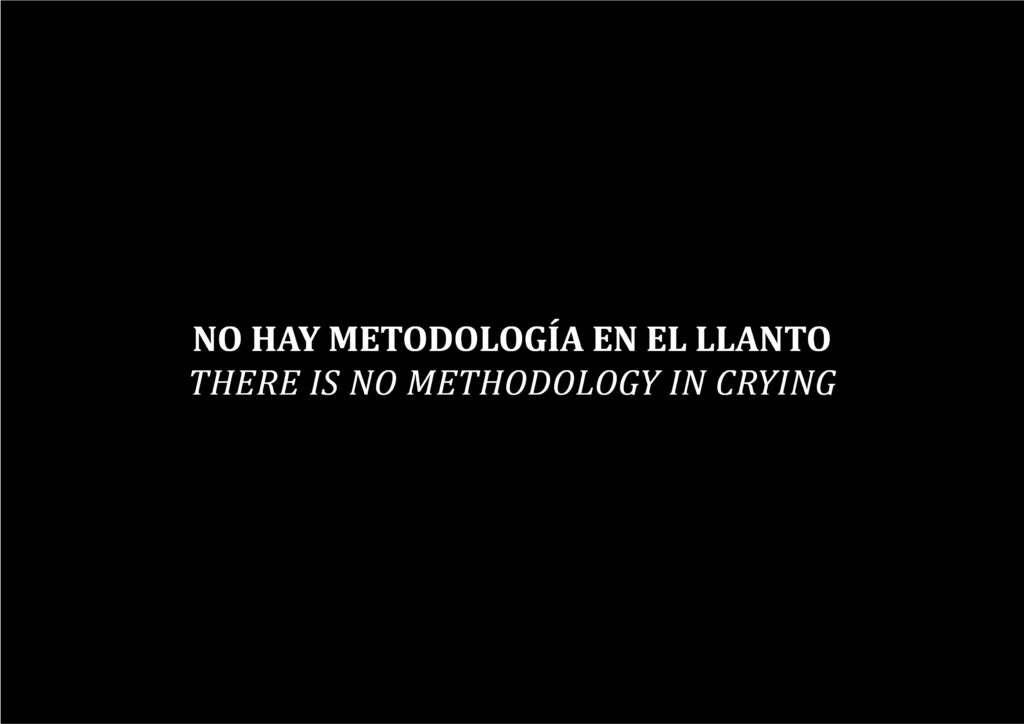
- Analú Laferal. Ladrida.
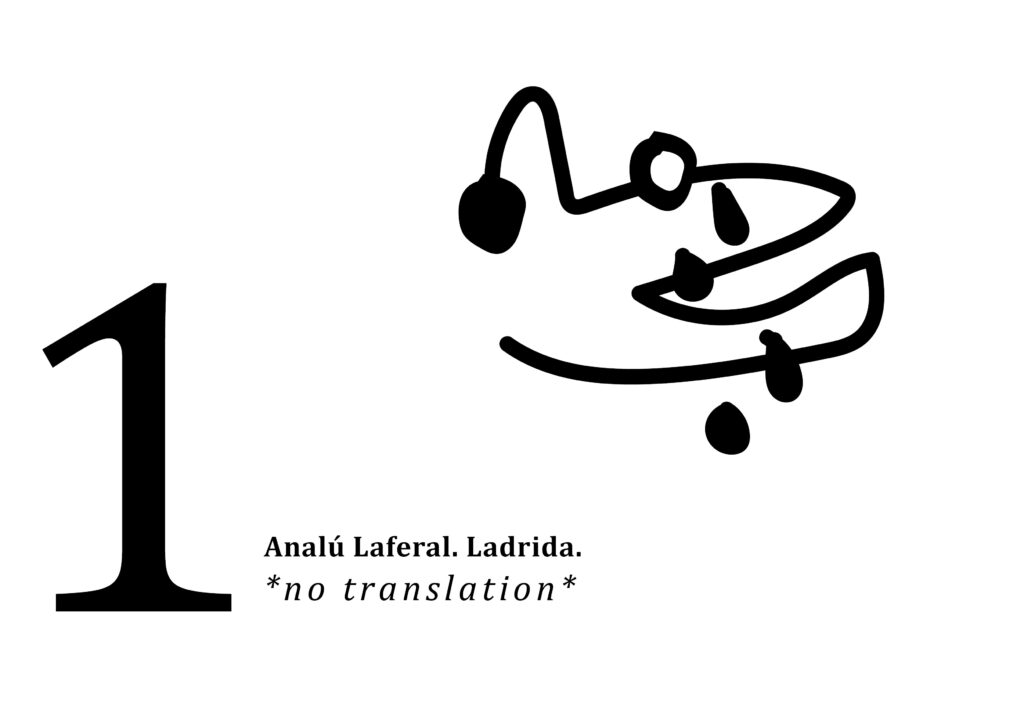
[Spanish]
En la ceremonia, en un punto importante del despliegue, le pidieron hablar a las mujeres asistentes —mientras el tambor acompañaba a todas las que se autoreconocían como una —. Después, el turno de los hombres: sus voces retumbaban en el espacio con la seguridad de esa provocación. Me perdí, cuando se dirigió el agua a mí —encerrada en ese cuenco limitado por piel— la dejé pasar. Así me sintiera mujer, a pesar de haber sido condenada al nacer como hombre, no supe en qué momento hablar. No sentía la certeza ni la certidumbre de quienes tomaban el bastón, la palabra. Terminaron las dos rondas, por encima de mí, y guardé silencio, me aferré a la quietud de mis cuerdas vocales. No quería hablar en ningún momento, y el Peyote ya estaba dentro, en la fornicación orgánica entre la planta, la saliva y la sangre. Tenía que hablar, pero no bajo las condiciones que me torturaron durante la vida. El silencio fue mi grito más duro, la manifestación en contra de los binarismos que me persiguieron —incluso en las estrategias azarosas con las que pensé liberarme—. Me sentí extranjera, ajena, asustada.
El estruendo de mi incomodidad se escuchó a la luz del sol que tomamos, con la medicina. La abuela empezó a contar que ella y las que le anteceden no creían en lo masculino ni lo femenino como materialidades obvias, sino que, más bien, los pensaban como estados de una misma sustancia. El agua fue en ese momento la forma en la que ella compartía con nosotrxs su claridad para ver y entender los cuerpos —afirmando que eso la hacía sagrada—. Dijo que la masculinidad era como la lluvia, vertical, que iba a fertilizar la tierra para que el alimento brotara; que esa misma lluvia terminaba en el mar, en los ríos y en los cuerpos horizontales, en lo femenino, una gran placenta que se mueve dentro y paralela a la tierra. Mientras iba hablando, en un dúo de palabras con el abuelo que nos acompañaba, explicó cómo entendían las proyecciones, las imposiciones. Comprendí que el agua, al igual que el travestismo, era una de las invocaciones de la potencia salvaje del movimiento (por eso tantas religiones la incluyen en sus ceremonias). Cuando la abuela empezó a detallar su idea sobre el recinto donde nos encontrábamos, llovió —una invocación, garantía del tejido compartido—; llovió y comencé a llorar, fui lluvia vertical sobre mi cuerpa, como la limpia necesaria que iba apartándose en los labios y reconociéndose horizontal con la saliva. Me sentí aguacero ventiao´, del que cae en diagonal. Me reconocí salpicadura del río, directo al cielo cuando cuerpo impacta la superficie y se funde en ella. Me vi agua, nieve, tormenta en el mar. Lloraba, al ritmo del tambor con vientre líquido reconocía la herencia, un lugar en medio de las certezas binarias que contaminaban la comprensión de cualquier latitud. Sentí gozo, del que parecen sentir las personas que danzan en las iglesias de garaje. Alucinación o no, el tambor tocó a un ritmo con el que todxs empezaron a cantar mi nombre: Analú, A-na-lú, A-na-lú, A-na-lú. En esa etapa del camino que emprendía ya no era Ana; también había dejado de ser Luis, hace mucho. Ya era una diagonal.
Bajó la palabra a la cuerpa, a la piel preparada con saliva y llanto, llegué a casa y tomé la primera progynova y espironolactona con tres tragos de agua, la medicina “real”. Sumando los comprimidos farmacéuticos, aseguraba mi tránsito (el cóctel residual de occidente reflejado en pastilla y la ancestralidad del agua que empujaré en lo profundo de mí por lunas). Fui desecho, huérfana de espiritualidad indígena, pude gestar una nueva realidad. Me supe en las latitudes donde las estaciones no pesan, travesti.
***
[English]
In the ceremony, at an important point of the display, the women in attendance were asked to speak —while the drum accompanied all those who recognized themselves as one—. Then it was the turn of the men: their voices echoed in the space with the certainty of that provocation. I got lost. When the water was offered to me -enclosed in that bowl limited by the skin- I let it pass. Even though I felt like a woman, and despite having been condemned to be born as a man, I did not know at what moment to speak. I did not feel the certainty or the certainty of those who took the baton, the word. Over me, the two rounds ended. I kept silent, and clung to the stillness of my vocal curdles. I didn’t want to speak at any time, and the Peyote was already inside, in the organic fornication between plant, saliva, and blood. I had to speak, but not under the conditions that tortured me through life. The silence was my harshest cry, the manifestation of the binarism that haunted me —even in the haphazard strategies with which I thought to free myself—. I felt foreign, alien, and frightened.
The rumble of my discomfort was heard in the sunlight we took with the medicine. Grandmother began to tell how she and those before her did not believe in the masculine and feminine as obvious materiality but rather thought of them as states of the same substance. Water was, at that time, how she shared with us her clarity in seeing and understanding bodies-asserting that this made her sacred. She said that masculinity was like rain, vertical, that it was going to fertilize the earth so that food would sprout; that the same rain ended up in the sea, in the rivers, and the horizontal bodies, in the feminine, a great placenta that moves within and parallels to the earth. As she spoke, in a duet of words with the grandfather who accompanied us, she explained how they understood the projections, the impositions. I understood that water, like transvestism, was one of the invocations of the wild power of movement (which is why so many religions include it in their ceremonies). When the grandmother began to detail her idea about the enclosure where we were, it rained – an invocation, a guarantee of the shared fabric -; it rained, and I began to cry. I was vertical rain on my body like the necessary cleanliness moving away on the lips and recognizing itself horizontally with the saliva. I felt like a ventilated downpour, the kind that falls diagonally. I recognized myself as a splash of the river, straight to the sky when my body hits the surface and melts into it. I saw myself in water, snow, and storm in the sea. I cried to the rhythm of the drum with a liquid belly. I recognized the inheritance, a place in the middle of the binary certainties that contaminated the understanding of any latitude. I felt joy, the kind that people who dance in garage churches seem to feel. Hallucination or not, the drum beat to a rhythm with which everyone began to chant my name: Analú, A-na-lú, A-na-lú, A-na-lú, A-na-lú. At that stage of the road I was taking, I was no longer Ana; I had also stopped being Luis, a long time ago. I was already a diagonal.
The word got down to the body, to the skin prepared with saliva and tears. I came home and took the first progynova and spironolactone with three gulps of water, the “real” medicine. Adding the pharmaceutical tablets, I ensured my transit (the residual cocktail of the West reflected in the pill and the ancestrality of water that I will push deep inside me for moons). I was a waste, an orphan of indigenous spirituality, but I was able to gestate a new reality. I knew myself in the latitudes where the seasons do not weigh, transvestite.
***
2. Juan Rulfo. Es que somos muy pobres.
[It’s Because We’re So Poor]
https://agnionline.bu.edu/fiction/its-because-were-so-poor/
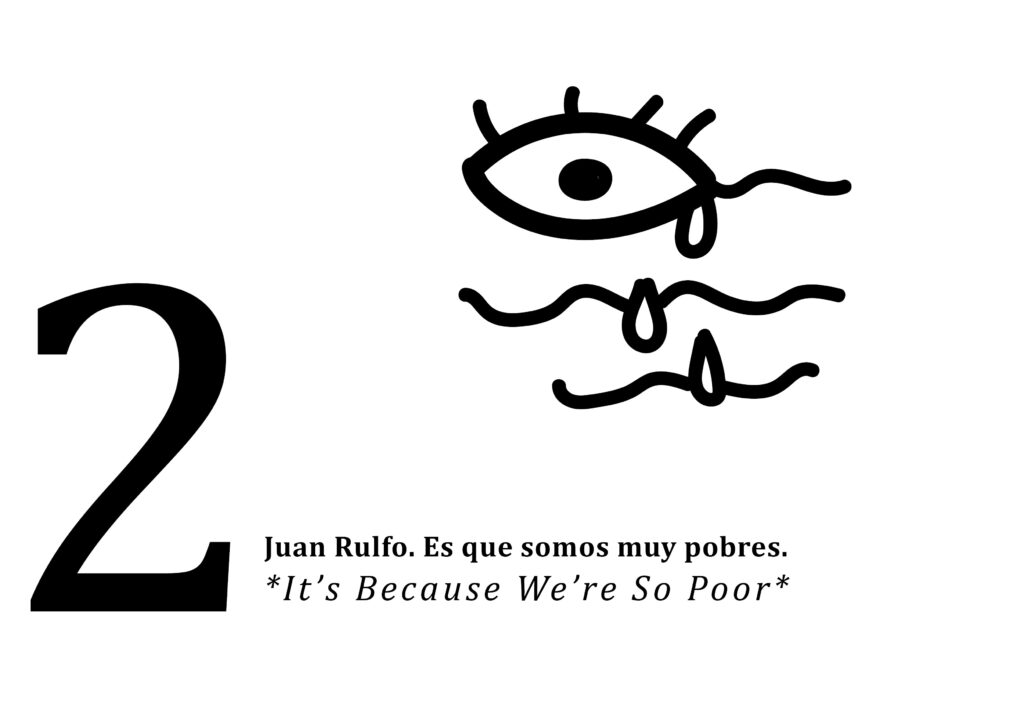
[Spanish]
La única esperanza que nos queda es que el becerro esté todavía vivo. Ojalá no se le haya ocurrido pasar el río detrás de su madre. Porque si así fue, mi hermana Tacha está tantito así de retirado de hacerse piruja. Y mamá no quiere.
Mi mamá no sabe por qué Dios la ha castigado tanto al darle unas hijas de ese modo, cuando en su familia, desde su abuela para acá, nunca ha habido gente mala. Todos fueron criados en el temor de Dios y eran muy obedientes y no le cometían irreverencias a nadie. Todos fueron por el estilo. Quién sabe de dónde les vendría a ese par de hijas suyas aquel mal ejemplo. Ella no se acuerda. Le da vueltas a todos sus recuerdos y no ve claro dónde estuvo su mal o el pecado de nacerle una hija tras otra con la misma mala costumbre. No se acuerda. Y cada vez que piensa en ellas, llora y dice: “Que Dios las ampare a las dos.” Pero mi papá alega que aquello ya no tiene remedio. La peligrosa es la que queda aquí, la Tacha, que va como palo de ocote crece y crece y que ya tiene unos comienzos de senos que prometen ser como los de sus hermanas: puntiagudos y altos y medio alborotados para llamar la atención. -Sí -dice-, le llenará los ojos a cualquiera dondequiera que la vean. Y acabará mal; como que estoy viendo que acabará mal. Ésa es la mortificación de mi papá.
Y Tacha llora al sentir que su vaca no volverá porque se la ha matado el río. Está aquí a mi lado, con su vestido color de rosa, mirando el río desde la barranca y sin dejar de llorar. Por su cara corren chorretes de agua sucia como si el río se hubiera metido dentro de ella. Yo la abrazo tratando de consolarla, pero ella no entiende. Llora con más ganas. De su boca sale un ruido semejante al que se arrastra por las orillas del río, que la hace temblar y sacudirse todita, y, mientras, la creciente sigue subiendo. El sabor a podrido que viene de allá salpica la cara mojada de Tacha y los dos pechitos de ella se mueven de arriba abajo, sin parar, como si de repente comenzaran a hincharse para empezar a trabajar por su perdición.
***
[English]
Our only hope is that the calf is still alive. Perhaps he didn’t think of crossing the river behind his mother. Because if he did, my sister Tacha is just this far away from becoming a whore. And mother doesn’t want that.
My mother doesn’t know why God has punished her by giving her such daughters, since in her family, from my grandmother on, there have never been bad people. Everybody was raised with the fear of God, and very obedient, and didn’t offend anyone. Everyone was that way. Who knows where her two daughters learned such bad behavior? She can’t figure it out. She wracks her brain and it isn’t clear where she went wrong or what sin she committed to have given birth to one bad daughter after another. She can’t figure it out. And every time she thinks of them, she weeps and says: “God help them.”
My father says there’s nothing to be done at this point. The one at risk is the daughter who is still here, Tacha, who keeps on growing and growing and whose breasts are already beginning to show, and which promise to be like her sisters’: pointy and high and pert and attention-getting. “Yes,” he says, “they’ll stare at her wherever she goes. It will all end badly; I can already see it will all end badly.” That’s why my father is terrified.
Tacha cries when she thinks her cow won’t come back because the river has killed it. She’s right here at my side, in her pink dress, looking at the river from the top of the ravine, unable to stop crying. Streams of dirty water run down her face, as if the river were inside her.
I put my arms around her, trying to comfort her, but she doesn’t understand. She cries even more. A sound similar to the one sweeping along the riverbanks emerges from her lips, making her shiver, and she trembles all over. The crest rises. the rotten smell from below speckles Tacha’s wet face. Her two little breasts bob up and down, continually, as if they had suddenly begun to swell, bringing her ever closer to perdition.
***
3. Oliverio Girondo. Llorar a lágrima viva. [Weep living tears!]
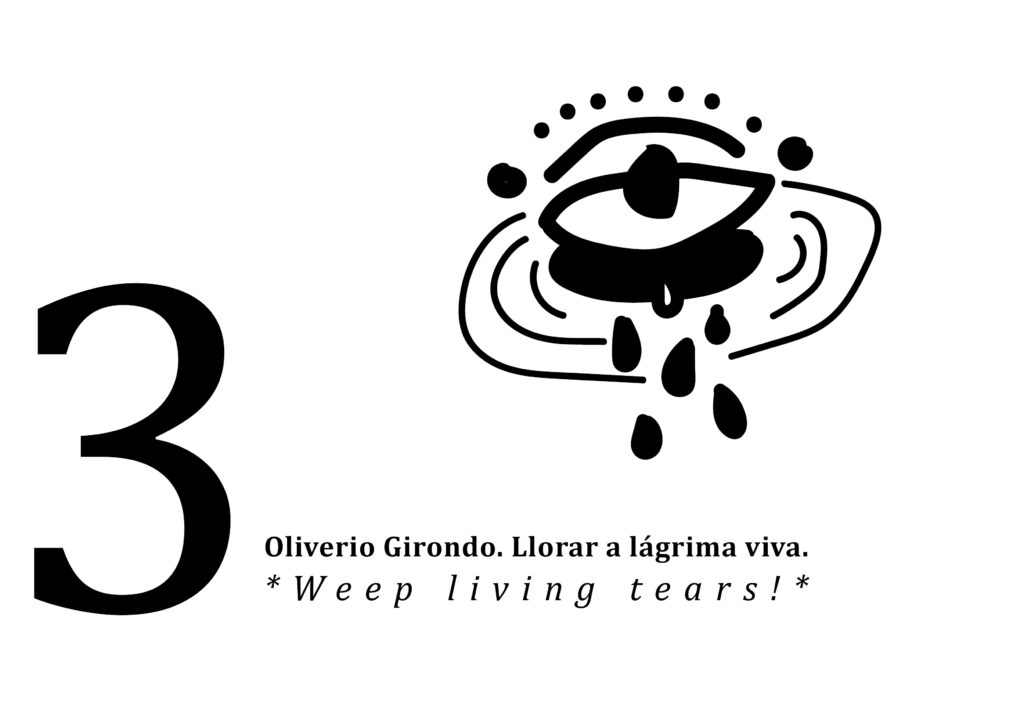
[Spanish]
Llorar a lágrima viva.
Llorar a chorros.
Llorar la digestión.
Llorar el sueño.
Llorar ante las puertas y los puertos.
Llorar de amabilidad y de amarillo.
Abrir las canillas,
las compuertas del llanto.
Empaparnos el alma, la camiseta.
Inundar las veredas y los paseos,
y salvarnos, a nado, de nuestro llanto.
Asistir a los cursos de antropología, llorando.
Festejar los cumpleaños familiares, llorando.
Atravesar el África, llorando.
Llorar como un cacuy, como un cocodrilo…
si es verdad que los cacuíes y los cocodrilos
no dejan nunca de llorar.
Llorarlo todo, pero llorarlo bien.
Llorarlo con la nariz, con las rodillas.
Llorarlo por el ombligo, por la boca.
Llorar de amor, de hastío, de alegría.
Llorar de frac, de flato, de flacura.
Llorar improvisando, de memoria.
¡Llorar todo el insomnio y todo el día!
***
[English]
Weep living tears!
Weep gushers!
Weep your guts out!
Weep dreams!
Weep before portals and at ports of entry!
Weep in fellowship! Weep in yellow!
Open the locks and calas of tears!
Let us soak our shirts, our souls!
Inundate the sidewalks and the boulevards,
and bear us along safely on the flood!
Assist in anthropology courses, weeping!
Celebrate relative’s birthdays, weeping!
Walk across Africa, weeping!
Weep like a caiman, like a crocodile…
especially if it’s true that caimans and crocodiles
have no real tears in them.
Weep anything, but weep well!
Weep with your nose, with your knees!
Weep through your navel, through your mouth!
Weep of love, of hate, of happiness!
Weep in your frock, from flatus, from frailty!
Weep impromptu, weep from memory!
Weep throughout the insomniac night
and throughout the livelong day!
